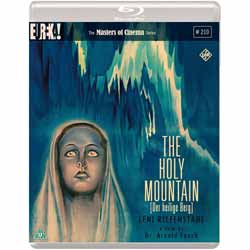|
Click here to return to the main site. Blu-ray Review
When Hitler couldn’t get Fritz Lang to be his overseer of cinema production for the Reich (Lang had fled to Hollywood even though he was not a Jew) he chose Leni Riefenstahl who had starred in The Holy Mountain, one of his all time favourite ‘mountain’ films, in fact the first of that particularly German genre. This popular favourite was directed by Dr Arnold Fanck. Fanck, utterly devoted to Riefenstahl, (one can do a lot of imagining here) had developed the Mountain script just for her. In three days. When one sees the spare frame of the narrative it doesn’t seem so miraculous. (Don’t laugh. W. C. Fields once wrote an outline for a movie on the back of an envelope and was paid a hundred thousand dollars for it.) Leni is a popular dancer, Diotima, in a sort of loopy Isadora Duncan school given to diaphanous tops and short-short satiny panties which allows a constant view of her ample legs and frequent crotch flashing. The cynic in me says this is the probable reason the Paper Hanger in Chief liked this mountain picture more than the star’s superior The White Hell of Pitz Palu (1929). The official reason given for the popularity of Mountain is that it took German audiences into a romantic projection of archetypal symbolism and noble values. I think it was Leni’s legs. Diotima, becomes the love object, the obsession, of two best friends and their ultimate showdown (unbeknownst to one suitor until it’s too late) is settled on the north face of a mountain no one should climb in the winter. The script may have taken only three days to write but the film took three winters to shoot, boasting of real, non-studio locations for all the outdoor footage – something any viewer will see is hype and simply not true. Nonetheless, with the cameras of the day, Holy Mountain is still an achievement. To contextualize where this lesser magnitude star shines in the pre-Reich filmic constellation, it is helpful to review the true magnificence of German film in Cinema Europe: The Other Hollywood, part III The Camera Unchained on YouTube. Mountain is weaker than most other German spectacles of the '20s. Its close-ups have low valence; it resorts to medium and medium long shots too readily; on second and third viewing it is tedious. This doesn’t happen to Riefenstahl in later years when she’s at the helm. A delicious bonus on this disc is the superlative documentary The Wonderful, Horrible Life of Leni Riefenstahl by Ray Müller, worth the retail price alone. Audio commentary by film historian Travis Crawford, plus a collector’s booklet with a new essay by critic and historian Kat Ellinger and a 2004 essay by Doug Cummings will make one an expert in all things Riefenstahl. Not a bad thing considering how under examined this pantheon filmmaker is. Four generations have reviled Riefenstahl for her Hitler films. Without beating the drum for that drug addled cacaphile, the films Riefenstahl made for him are worthy of cinematic study. And truth be told, examining them will feel like familiar turf for addicts of super hero epics that have grossed billions. So, kids, somebody’s been watching Leni even if they don’t admit it. Riefenstahl soaked up filmmaking knowledge like an avid pupil of Dr Fanck and this is why the movie is important. Holy Mountain was her film school. She learned camera, lighting, angle, editing, art direction, rhythm, blocking, staging action and how to run a crew. The latter skill, no doubt, included directing a director. Once one learns this, one can be the director. It would all come in handy in few years. Her crew would be the German Army. Her technical hardware the best in the world. Her budgets unlimited. And she was the only person in the universe who could tell Adolf what to do. ‘Mein Führer, move a step to your right, please…’ Her acting here in Mountain is unsubtle, often annoyingly owl-eyed, toward the goo-goo end of the spectrum. She was no Garbo or Louise Brooks. Improvement can be seen in Pitz Palu when she doesn’t rely as much on her legs. Or crotch. The origin of the mountain genre begins here and that’s why Eureka’s Blu-ray UK debut is important, digitally restored in 2K into a 1080p presentation, all stemming from a scholarly German restoration effort in 2014. Flawless for elements nearly a century old. But then Hitler is making a comeback, isn’t he? Just kidding, just kidding. 5 John Huff Buy this item online
|
|---|

